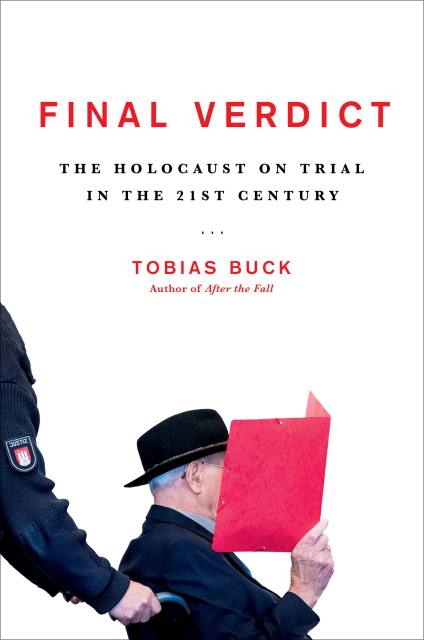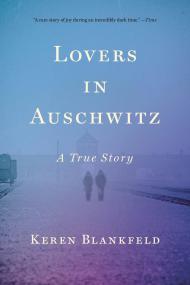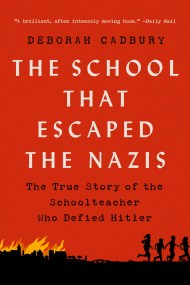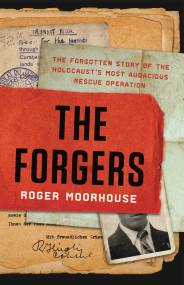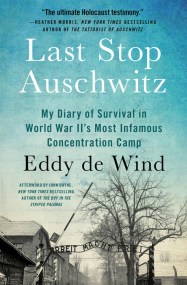Promotion
Use code ARIES25 for 20% off sitewide + free shipping over $35
Final Verdict
The Holocaust on Trial in the 21st Century
Contributors
By Tobias Buck
Formats and Prices
Price
$32.00Price
$41.00 CADFormat
Format:
- Hardcover $32.00 $41.00 CAD
- ebook $15.99 $20.99 CAD
- Audiobook Download (Unabridged) $27.99
This item is a preorder. Your payment method will be charged immediately, and the product is expected to ship on or around April 30, 2024. This date is subject to change due to shipping delays beyond our control.
Also available from:
Bruno Dey’s trial formed part of an extraordinary series of Holocaust cases brought by German prosecutors in recent years in a belated attempt to deliver justice to the victims and reverse decades of judicial neglect. It also surfaced at a pivotal moment for Germany and its thinking about the Holocaust. The Nazi genocide continues to occupy a crucial space in German public life, but many of the country’s long-held certainties and convictions around the Holocaust are starting to fray. This reflects in part the passage of time, and the fact that the last surviving witnesses—victims and perpetrators alike—are rapidly fading away.
But it’s also the result of profound changes in German politics and society. The far-right has made electoral gains and is openly challenging the country’s historic commitment to Holocaust remembrance. At the same time, there is a small but vociferous group of intellectuals on the left who question Germany’s memory culture from a different angle, asking what political lessons the country should draw from the Holocaust today. What does it mean for the country’s new Muslim citizens from Syria and Afghanistan, many of whom arrived with their own traumas, to be expected to assume the nation’s guilt?
Final Verdict investigates questions that touch on German history, politics, and memory culture, and on the author’s own family history. Buck revisits the silence that surrounds his own family’s experiences and conduct during the Nazi period. In the face of rising anti-Semitism in Germany, the United States, and globally, Final Verdict examines the case for Holocaust justice in the twenty-first century—and the lessons that Germany’s struggle with its Nazi past holds for the world today.
Genre:
-
**One of The Guardian's Nonfiction to Look Out For in 2024**
-
"Final Verdict is a thrilling read. It is a book that raises a myriad of fascinating questions and human dramas, beautifully constructed and enticingly written."Philippe Sands, author of East West Street and The Ratline
-
"Timely and deeply thought-provoking--The Last Verdict examines how German courts let hundreds of thousands of Holocaust perpetrators off the hook until only a few low-level concentration camp guards remained alive to prosecute. Tobias Buck navigates the thicket of thorny questions surrounding this vexed and vexing history with great scope and sensitivity."Philip Gourevitch,We Wish to Inform You That Tomorrow We Will Be Killed with Our Families
-
"When [Buck] writes of the detractors of some memorials, his point comes through elegantly: We contest not only what we remember, but how we remember....Excellent reporting."The Washington Post
-
“The author provides a powerful guide to the proceedings and their context….Final Verdict provide[s] a fresh perspective on how Germans have negotiated their sense of historical and individual responsibility.”The Wall Street Journal
-
"Through a riveting account of the trial of ninety-three-year-old Bruno Dey, a guard at Stutthof concentration camp...'the smallest of small cogs' in the SS hierarchy, Buck compellingly shows how history is always present, never past."Catrine Clay, author of The Good Germans
-
“Once I started it, I really couldn’t stop. There was so much food for thought about morality, responsibility, crime, victimhood, and agency, all tied beautifully to one single case.”Katja Hoyer, author of Beyond the Wall and host of "Zeitgeist" podcast
-
“[A] lucid, timely study of Germany’s fraught reckoning with its past….This is a narrative that wrestles—calmly and very elegantly—with huge questions….This is a brilliant book…I was glad of Buck’s unshowy, measured style: on the page, he makes complicated things (the law, especially) straightforward…his prose is in the service of ideas and other human beings who have more to say than him….Above all, I found it…to be important….Books such as Final Verdict have never been more necessary.”The Observer
-
“Gripping and fascinating…[an] absorbing book.”The Telegraph (5 stars)
-
“In this informed, thoughtful work [Buck] skillfully weaves together his investigation into his own family’s Nazi past — and their attempts to disguise it — with broader themes of historical justice and culpability…. Buck is strong on untangling the legal chicanery that allowed so manyThe Times (UK)
murderers to escape with the lightest of sentences…. [A] masterly account.” -
“Final Verdict is a gripping read from first to last. Using the Bruno Dey trial as its central core, Tobias Buck provides a wide-ranging survey of how German jurisprudence came to terms with the magnitude of the crimes committed by the Nazi regime in the name of the German people, but also with the degree of guilt involved in simply ‘obeying orders.’ Buck’s deep research into his subject makes his book highly informative and thought-provoking…. Final Verdict is an important contribution to understanding the impact of the Holocaust on the nation from which it emanated. Buck explains how Germany has come to terms with its guilt and responsibility, and how the Holocaust has assumed a centrality in the national consciousness. This is a book that deserves to be read.”The Jerusalem Post
-
“Absorbing...[Buck's] insightful book examines questions of guilt, complicity and collaboration."Jewish Chronicle
-
“A compelling courtroom drama… raising deep questions of history, collective memory, justice and complicity.”Tim Harford, bestselling author of The Undercover Economist
-
“[A] lucid account….Buck crisply explains the legal hurdles that thwarted prosecution of alleged German perpetrators in West German courts."HistoryToday.com
-
"Compelling... enticing prose... While the book includes a wealth of highly organized information that will appeal to serious scholars and students of history and culture, Buck’s lively writing will also invite anyone with an interest in Germany, the Nazi era, or the complex problems of today’s political systems to listen and learn."Jewish Book Council
- On Sale
- Apr 30, 2024
- Page Count
- 336 pages
- Publisher
- Grand Central Publishing
- ISBN-13
- 9780306832307
Newsletter Signup
By clicking ‘Sign Up,’ I acknowledge that I have read and agree to Hachette Book Group’s Privacy Policy and Terms of Use





